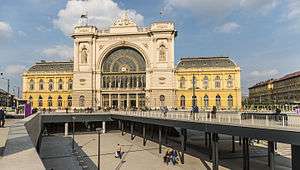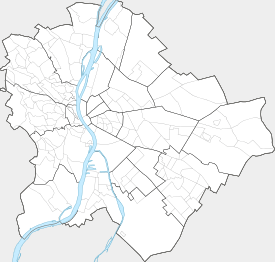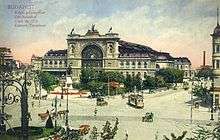Budapest Keleti railway station
Budapest Keleti railway station Keleti pályaudvar (Hungarian) | |
|---|---|
 Budapest Keleti viewed from the west. | |
| Location |
Kerepesi út 2-4 1087 Budapest Hungary |
| Coordinates | 47°30′01″N 19°05′02″E / 47.50028°N 19.08389°ECoordinates: 47°30′01″N 19°05′02″E / 47.50028°N 19.08389°E |
| Owned by | Hungarian State Railways (MÁV) |
| Line(s) |
1 Bp.Keleti pu. - Hegyeshalom 80 Bp.Keleti pu. - Sátoraljaújhely 120 Bp.Keleti pu. - Lőkösháza 150 Bp.Keleti pu. - Kelebia |
| Platforms | 18 |
| Connections |
Metro: Tram: |
| Construction | |
| Architect | Gyula Rochlitz |
| History | |
| Opened | 16 August 1884 |
| Location | |
 Keleti pályaudvar Keleti pályaudvar (Budapest) | |

Budapest Keleti (eastern) railway station (Hungarian: Budapest Keleti pályaudvar) is the main international and inter-city railway terminal in Budapest, Hungary.
The station stands where Rákóczi Avenue splits to become Kerepesi Avenue and Thököly Avenue. Keleti pályaudvar translates to Eastern Railway Terminus. Its name in 1891 originates not only for its position as the easternmost of the city's rail termini, but for its original role as a terminus of the lines from eastern Hungary including Transylvania, and the Balkans. In contrast, the Nyugati (western) railway station used to serve lines toward Vienna and Paris.
Architecture
The building was designed in eclectic style by Gyula Rochlitz and János Feketeházy and constructed between 1881 and 1884 as one of the most modern railway stations of Europe. The main façade is adorned with two statues depicting James Watt and George Stephenson. Inside the station are frescos by Karoly Lotz.[1]
Train services
The station is served by the following services:
- Railjet services
- Bp-Keleti pu. - Győr - Vienna - St Pölten - Linz - Salzburg Hbf
- Bp-Keleti pu. - Győr - Vienna - St Pölten - Linz - Salzburg - München Hbf
- Bp-Keleti pu. - Győr - Vienna - St Pölten - Linz - Salzburg - Innsbruck - Zürich Hb
- EuroCity services – EC
- (Lehár) Bp-Keleti pu. - Tatabánya - Győr - Wien Westbf
- (Petrov) Bp-Keleti pu. - Bratislava - Brno hl. n.
- (Csárdás, Jaroslav Hasek, Slovan) Bp-Keleti pu. - Bratislava - Brno - Praha hl. n.
- (Hungária) Bp-Keleti pu. - Bratislava - Brno - Prague - Dresden - Berlin Hbf
- (Jeszenszky János, Porta Bohemica) Bp-Keleti pu. - Bratislava - Brno - Prague - Dresden - Berlin - Hamburg-Altona
- EuroNight services – EN
- (Kálmán Imre) Bp-Keleti pu. - Győr - Vienna - St Pölten - Linz - Salzburg - München Hbf
- (Metropol) Bp-Keleti pu. - Bratislava - Brno - Prague - Dresden - Berlin Hbf
- (Ister) Bp-Keleti pu. - Szolnok - Békéscsaba - Arad - Deva - Sibiu - Brasov - Bucureşti Nord
- Int. InterCity services – IC
- (Rába) Bp-Keleti pu. - Győr - Szombathely - Graz Hbf
- (Rippl-Rónai) Bp-Keleti pu. - Dombóvár - Kaposvár - Koprivnica - Zagreb Glavni Kol.
- (Hernád, Rákóczi) Bp-Keleti pu. - Miskolc - Košice
- (Corona, Hargita) Bp-Keleti pu. - Szolnok - Püspökladány - Oradea - Cluj Napoca - Miercurea Ciuc - Brasov
- (Körös) Bp-Keleti pu. - Szolnok - Békéscsaba - Arad - Timişoara Nord
- (Transsylvania) Bp-Keleti pu. - Szolnok - Békéscsaba - Arad - Deva - Sibiu - Brasov
- (Traianus) Bp-Keleti pu. - Szolnok - Békéscsaba - Arad - Timişoara - Drobeta Tr.Severin - Craiova - Bucureşti Nord
- Int. Express services
- (Dacia) Wien Westbf - Győr - Tatabánya - Bp-Keleti pu. - Szolnok - Békéscsaba - Arad - Deva - Brasov - Bucureşti Nord
- (Beograd) Bp-Keleti pu. - Kiskunhalas - Subotica - Novi Sad - Belgrade
Inland
- Intercity services – IC
- (Borostyánkő-Tűztorony, Claudius-Volt Fesztivál, Savaris-Scarbantia, Alpokalja-Kékfrankos, Répce-Sopron Bank)
Bp-Keleti pu. - Kelenföld - Tatabánya - Győr - Csorna / Répcelak - Szombathely / Sopron - (Baranya, Dráva, Mecsek, PTE, Sopianae, Tenkes, Tettye, Tubes, Zengő)
Bp-Keleti pu. - Kelenföld - Sárbogárd - Pincehely - Dombóvár - Sásd - Szentlőric - Pécs - (Abaúj, Borsod, Hámor, Lillafüred, Sajó, Szinva)
Bp-Keleti pu. - Füzesabony - Miskolc-Tiszai - (Dália, Jázmin, Kamilla, Rózsa)
Bp-Keleti pu. - Füzesabony - Miskolc-Tiszai - Szerencs - Tokaj - Nyíregyháza - (Tokaj, Tulipán)
Bp-Keleti pu. - Füzesabony - Miskolc-Tiszai - Szerencs - Tokaj - Nyíregyháza - Debrecen - (Alföld, Békés, Csanád, Viharsarok)
Bp-Keleti pu. - Szolnok - Mezőtúr - Gyoma - Mezőberény - Békéscsaba - Kétegyháza - Lőkösháza
- (Borostyánkő-Tűztorony, Claudius-Volt Fesztivál, Savaris-Scarbantia, Alpokalja-Kékfrankos, Répce-Sopron Bank)
| Preceding station | MÁV START | Following station | ||
|---|---|---|---|---|
toward Zürich HB | Railjet | Terminus | ||
toward München Hbf | Railjet | Terminus | ||
Vác toward Hamburg Hbf | EuroCity | Terminus | ||
toward Ljubljana | EuroCity | Terminus | ||
Vác toward Berlin Hbf | EuroNight | Terminus | ||
toward Wien Hbf | EuroNight | toward Bucharest |
||
toward Zürich HB | EuroNight | Terminus | ||
toward München Hbf | EuroNight | Terminus | ||
| Terminus | InterCity | toward Brașov |
||
| Terminus | InterCity | toward Timișoara Nord |
||
| Terminus | InterCity | Budapest-Ferencváros toward Belgrade |
||
toward Zagreb Glavni kolodvor | InterCity | Terminus |
Metro
Keleti pályaudvar has been a station on the M2 (East-West) line of the Budapest Metro since the line opened in 1970. The metro station is 14 metres (46 ft) underground and 193 metres (633 ft) in length with the platform 180 metres (590 ft). In March 2014, Line 4 opened making Keleti a transfer point between the two Metro lines.[2]
Airport
A planned fast train service would connect the station with Budapest Liszt Ferenc International Airport. Since 36 of 53 Intercity services to Budapest operate from this railway station, it seems highly probable that this plan will materialize.
Baross tér redevelopment
The façade of Budapest Keleti faces onto a large three-sided plaza called Baross tér. In 2005, work began to construct a pedestrian concourse and exits to allow better access between the Keleti Pályudvar Station on Budapest Metro Line 4 and long-distance train facilities. The statue of Gábor Baross, for whom the square is named, was returned to its location in December 2013 and work completed in March 2014.[3]
Public Transport
Budapest Keleti railway station is located in the 8th district of Budapest, Hungary.
- Metro:



- Tram:
 24
24 - Trolleybus:
 73, 76, 68, 79, 80, 80A
73, 76, 68, 79, 80, 80A - Bus:
 5, 7, 7E, 8, 20E, 30, 30A, 107, 110, 112, 133, 178, 230, 233, 239
5, 7, 7E, 8, 20E, 30, 30A, 107, 110, 112, 133, 178, 230, 233, 239 - Nocturnal lines:
 907, 908, 931, 956, 973, 990
907, 908, 931, 956, 973, 990
Distance from other railway stations
Hungary
|
Europe
|
Gallery
 The station around 1900
The station around 1900 Thököly Avenue entrance to Lotz Hall
Thököly Avenue entrance to Lotz Hall- The old ticket hall
 Lotz Hall entry to main shed
Lotz Hall entry to main shed Keleti railway station after the Battle of Budapest, 1945
Keleti railway station after the Battle of Budapest, 1945 Baross tér Construction in December 2008
Baross tér Construction in December 2008 Train shed looking toward Baross tér
Train shed looking toward Baross tér Overhead view looking west
Overhead view looking west Eastern lights (7th prize photo on Wiki Loves Monuments 2013)
Eastern lights (7th prize photo on Wiki Loves Monuments 2013)- Looking west into the main hall
| Wikimedia Commons has media related to Eastern Railway Station (Budapest). |
References
- ↑ "Keleti Train Station". Budapest City Guide.com. Retrieved 2014-12-02.
- ↑ "Automated metro Line M4 opens in Budapest". Railway Gazette International. 28 March 2014.
- ↑ "The statue of Gábor Baross in a worthy place again" (Press release). Mayor’s Office of the Municipality of Budapest. 6 December 2014. Retrieved 2014-12-02.
External links
- A picture from about 1905
- The façade
- More photos: (1), (2), (3), (4)
- Metro station
- Virtual tour outside station
- Aerial photographs of the Station
- Station Plan